By David P. Diaz, Ed.D.

In part 1 of this two-part essay, I demonstrated through sufficient reasons that materialism1 is bankrupt and void as a rational explanation of the origin of the universe. Materialism entails insoluble problems (e.g., how something comes from nothing or how mindless matter can serve as the cause of a rational mind) and must create new or unaccepted beliefs for explaining the appearance of the universe (e.g., that the laws of nature somehow spontaneously brought the universe into existence). Materialism ultimately must reject the distinction between mind and brain and must also reject authentic freedom of choice, in favor of determinism.
Thus, with the lack of sufficient reasons to believe in materialism, the rational thinker should instead look for alternative hypotheses for the cause of the universe. I am postulating that a metaphysical being2 was responsible for creating the universe. In the remainder of this essay, I will endeavor to show why and how this claim best explains the existence and nature of the universe, and why it serves as a rational belief.
Scientific Methodology and Metaphysics
As a first consideration, I would like to talk about the role of science in discussions regarding the origin of the universe. Most current scientific disciplines adhere to some form of methodological naturalism.3 As I noted in part 1, this is entirely legitimate for probing questions about the natural universe, but is sadly lacking when attempting to understand the nature of reality, which includes metaphysical entities. Ironically, however, science bases its own methodology on many metaphysical/philosophical presuppositions, whether anyone realizes it or not. For example, the existence of truth and the knowability of the external world, the orderly nature of the external world, the existence of laws of logic, and the normative values of honesty and objectivity in reporting, to name just a few. Thus, science is fundamentally based on rarely mentioned, yet clearly metaphysical, precepts.
How then should a rational, scientific mind address the claim of a metaphysical origin of the universe?
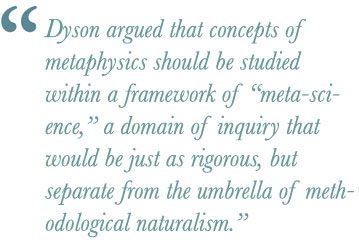 For quite some time, scientists have expressed a desire to legitimately study ultimate concerns such as the origin of the universe while also preserving critical elements of scientific method. In the discipline of health promotion, Fahlberg and Fahlberg (1991) suggested that our present concept of science should be expanded to include the study of metaphysical phenomena (i.e., spirituality and spiritual health topics). This would involve the development of a scientific epistemology4 that is based in direct experience or contemplative awareness (Ibid). In the field of physics, Freeman Dyson (1988) argued that concepts of metaphysics should be studied within a framework of “meta-science,” a domain of inquiry that would be just as rigorous, but separate from the umbrella of methodological naturalism. He noted that a teleological style of scientific explanation would allow a role for purpose, while a non-teleological style would exclude metaphysical considerations and restrict phenomena to the naturalistic realm of laws and causes (pg. 296). Dyson also suggested that, within reason, scientists should be willing to submit every [italics added] belief and theory to rigorous critical examination, and should be essentially open-minded (Ibid, pg. 11).
For quite some time, scientists have expressed a desire to legitimately study ultimate concerns such as the origin of the universe while also preserving critical elements of scientific method. In the discipline of health promotion, Fahlberg and Fahlberg (1991) suggested that our present concept of science should be expanded to include the study of metaphysical phenomena (i.e., spirituality and spiritual health topics). This would involve the development of a scientific epistemology4 that is based in direct experience or contemplative awareness (Ibid). In the field of physics, Freeman Dyson (1988) argued that concepts of metaphysics should be studied within a framework of “meta-science,” a domain of inquiry that would be just as rigorous, but separate from the umbrella of methodological naturalism. He noted that a teleological style of scientific explanation would allow a role for purpose, while a non-teleological style would exclude metaphysical considerations and restrict phenomena to the naturalistic realm of laws and causes (pg. 296). Dyson also suggested that, within reason, scientists should be willing to submit every [italics added] belief and theory to rigorous critical examination, and should be essentially open-minded (Ibid, pg. 11).
I prefer Dyson’s separation between meta-science and scientific method. This distinction is critical when studying metaphysical topics whose arguments can be impacted by the findings of science, but may also be clarified through meta-science. The meta-science proposal preserves the integrity and the historical basis of scientific method while also providing a legitimate role for alternate modes of knowing and methods of discovery.
My own process in examining the origin of the universe provides a role for meta-science in building a rational platform to explore the concept of metaphysical reality. I am using the “givenness” and/or consensus of rational norms5 to guide the parts of my discussion that fall outside of empirical science, and I am using the findings of science to add weight and clarity to those parts of the discussion that fall outside of meta-science.
Application of this joint method of inquiry requires using the findings (and in some cases the language) of meta-science (i.e., philosophy, theology, etc.) as well as the findings and language of science (i.e., physics, biology, etc.). Though utilized separately, meta-science and science can be implemented together to explore questions of ultimate reality. In this way, meta-science can complement and enhance science and vice versa.
So, how can science and meta-science together shed light on the cause of the universe?
A Metaphysical Cause of the Universe
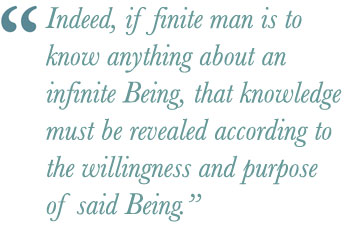 Most would probably agree that man is a finite being: we learn, we grow and we change, continuously. In other words, we are not infinite in knowledge, maturity, wisdom, or in any other way. If the finiteness of mankind is granted, then it must also be granted that it would be, in principle, impossible for a finite being to exhaustively define or describe a finite universe, let alone an infinite one. Further, it would also be impossible to ascertain that any given metaphysical entity does not exist because, for finite beings, reality perpetually remains an open field of discourse. Thus, given our finiteness, and assuming we possess an open-mindedness that seeks to know the truth, what types of evidence can be brought forth regarding the claim that a metaphysical entity was responsible for the creation of the universe?
Most would probably agree that man is a finite being: we learn, we grow and we change, continuously. In other words, we are not infinite in knowledge, maturity, wisdom, or in any other way. If the finiteness of mankind is granted, then it must also be granted that it would be, in principle, impossible for a finite being to exhaustively define or describe a finite universe, let alone an infinite one. Further, it would also be impossible to ascertain that any given metaphysical entity does not exist because, for finite beings, reality perpetually remains an open field of discourse. Thus, given our finiteness, and assuming we possess an open-mindedness that seeks to know the truth, what types of evidence can be brought forth regarding the claim that a metaphysical entity was responsible for the creation of the universe?
Metaphysical Being as the Cause of the Universe
Current science has helped us to understand the nature and operation of our universe. Among other things, Big Bang cosmology has introduced the probability of the finitude of the observable universe. That is, the standard Big Bang model of the universe implies a beginning to our universe, prior to which there was no physicality.6 There was no time, space, or matter before the Big Bang because each had its beginning at the initial singularity. Therefore, something outside of physical reality must have caused the physical universe to exist.
Expansion of the universe also plays into the theoretical basis for belief in a finite universe. Inflation theory postulates an exponential expansion of space for a fraction of a second after the Big Bang (approximately 10−33 seconds, give or take some such minute fraction) followed by a subsequent less rapid expansion of the universe. A more recent update to expansion theory—the theory of Dark Energy—asserts that the inflation rate is now speeding up. That is, dark energy, which is thought to permeate all of space (comprising 70% of the total energy of the universe), acts like anti-gravity to allow space to expand more and more rapidly. The realization of this theory means that the universe will likely expand forever and with increasing speed (Dienes, 2017). Prior to the theory of dark energy, it was thought that perhaps the universe was the product of an infinite succession of bounces: an endless cycle of expansion and contraction. Since dark energy theory shows the universe is expanding at a continually increasing speed, “there will be no big crunch—and no bounce. That puts a big crimp into the notion of a universe that is endlessly bouncing (Spitzer, 2010).”
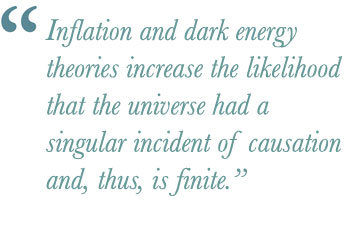 Expansion and dark energy theories increase the likelihood that the universe had a singular incident of causation (i.e., an initial singularity) and, thus, is finite. This proposal of an initial singularity provides a point of contact between physics (i.e., science and associated methods) and metaphysics (i.e., meta-science and associated methods).7 Together, the Big Bang and related theories8 serve to increase the probability of a transcendent,9 supernatural cause of the universe (Spitzer, 2010).
Expansion and dark energy theories increase the likelihood that the universe had a singular incident of causation (i.e., an initial singularity) and, thus, is finite. This proposal of an initial singularity provides a point of contact between physics (i.e., science and associated methods) and metaphysics (i.e., meta-science and associated methods).7 Together, the Big Bang and related theories8 serve to increase the probability of a transcendent,9 supernatural cause of the universe (Spitzer, 2010).
Below are the reasons why the postulation that a metaphysical being created the universe better explains the existence and nature of the universe than materialism or any other deterministic theory. In providing this rationale, I will illuminate what I believe to be essential attributes of said being.
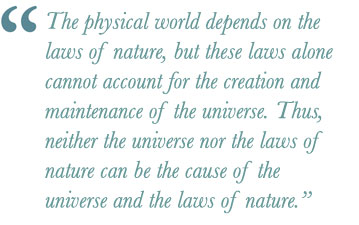 A transcendent, infinite, eternal entity is consistent with the existence of the physical universe. Current theories in physics have increased the probability that the physical universe had a beginning. Any entity that could cause the physical universe must also exist separate and apart from the created universe and subsequent effects. Thus, time, space, and matter can neither circumscribe nor in any way limit such an entity. The physical world depends on the laws of nature, but these laws alone cannot account for the creation and maintenance of the universe. Thus, neither the universe nor the laws of nature can be the cause of the universe and the laws of nature. In other words, they cannot have been their own cause. As a result, they should be considered derivative causes and not primary ones. Since causality is itself a product of the space-time continuum, only contingent or finite entities need a cause. Any entity or being that exists outside of, or transcendent to, space and time would not need a cause. Such an entity would be an eternal and uncaused cause. The creation of the universe required a cause outside of the universe that was sufficient (i.e., capable of bringing forth something from nothing), eternal (i.e., not temporal), infinite (i.e., without qualitative limitations), and transcendent (i.e., outside of and beyond the physical universe). On the other hand, a materialist must assert that the universe is either an infinite regress of causes, or that it came from nothing (i.e., without a cause), both of which are absurd (see part 1 of this two-part essay).
A transcendent, infinite, eternal entity is consistent with the existence of the physical universe. Current theories in physics have increased the probability that the physical universe had a beginning. Any entity that could cause the physical universe must also exist separate and apart from the created universe and subsequent effects. Thus, time, space, and matter can neither circumscribe nor in any way limit such an entity. The physical world depends on the laws of nature, but these laws alone cannot account for the creation and maintenance of the universe. Thus, neither the universe nor the laws of nature can be the cause of the universe and the laws of nature. In other words, they cannot have been their own cause. As a result, they should be considered derivative causes and not primary ones. Since causality is itself a product of the space-time continuum, only contingent or finite entities need a cause. Any entity or being that exists outside of, or transcendent to, space and time would not need a cause. Such an entity would be an eternal and uncaused cause. The creation of the universe required a cause outside of the universe that was sufficient (i.e., capable of bringing forth something from nothing), eternal (i.e., not temporal), infinite (i.e., without qualitative limitations), and transcendent (i.e., outside of and beyond the physical universe). On the other hand, a materialist must assert that the universe is either an infinite regress of causes, or that it came from nothing (i.e., without a cause), both of which are absurd (see part 1 of this two-part essay).- An intellectual entity (i.e., an entity with a mind) who is the source of all information is consistent with a universe of complexity and design. Information10 is the essential precursor to the existence of the universe. The creation of a universe of design and complexity required a source of information that was purposive (i.e., capable of intention and/or design). This requires the existence of an intelligent mind. Though the application of information is what we see exemplified in the universe, the universe is uniquely dependent upon a mind and is not derived from the non-mental (Hanna, 2011). That is, information itself consists of meanings, concepts and propositions (which are capable of being true or false); hence, information is always the property of mind. The immense complexity of the information encoded into atomic structure, DNA, and into every aspect of the universe from microcosm to macrocosm gives witness to a being who is the source of incredible information and who is the author of complexity and design. Materialism instead posits that complexity and design can be accounted for solely through the laws of the physical universe: Physical universe + time + accident = complexity and design in the universe.
- A being with an intellect, or mind who is the genesis of all other minds is consistent with purely mental phenomena. If mind and the brain are equivalent, as claimed by materialists, then materialism cannot be true. If the mind cannot ascend above neurological mechanisms, then all claims are predetermined; including the claim that mind is equivalent to the brain. The materialist can’t have determinism and truth-value. The fact that the human mind is temporal (existing in time) but not spatial (existing in space) and yet is able to grasp ideal entities that are neither spatial nor temporal (e.g., numbers, laws of logic) demonstrates that the mind transcends mere neurology and gives witness to an intelligent, creative mind. Because of the underlying assumptions of their theory, materialists must believe that mindless matter and blind cause and effect are responsible for a rational mind: Physical universe + time + accident = rational mind.
- A personal being is consistent with the existence of other personal beings in the universe. That such a being created other beings capable of love, hope and other personal interactions, better explains the appearance of personal beings than does impersonal matter. My claim that the cause of the universe is a personal being is evidenced in the unique existence of mankind. Human consciousness, self-awareness, individuality, emotions, and more, all attest to a creative, personal being. Emotions, rational thought, and personal relationships are not reducible to biochemical and physiological reactions and therefore are not a product of impersonal matter. And yet, materialism must assert that personal beings have arisen from blind, material causes: Physical universe + time + accidents = personal beings.
- A being who is the author of purpose and meaning is consistent with freedom of choice. The freedom of humans to choose seems self-evident to most of us. But the determinism inherent in materialism causes many to believe that decision-making is ultimately pre-determined. (Of course, that hasn’t stopped materialists from arguing their case, as if they had any choice about it.) Freedom to choose is one of the most assured facts of human knowledge. To assert that freedom of choice is a delusion is in itself a delusion because one must be authentically free to make that distinction. You cannot have freedom and determinism. Freedom of choice is what adds meaning and ultimate purpose to our lives. The ability to choose one path and not another, the capacity to major in biology instead of physics, the choice to serve others rather than dominate them are a few examples of how personal lives can take on meaning, add value, create happiness, and provide purpose.
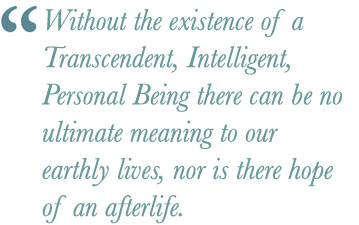 Without the existence of a transcendent, intelligent, personal being there can be no ultimate meaning to our earthly lives, nor is there hope of an afterlife. Religious beliefs are deeply embedded in the human psyche and determinism falls short of telling us why. If all our thoughts and deeds are the product of physical causes (i.e., determinism), our lives are ultimately meaningless and void of purpose. For if any claim to authentic purpose is the product of blind, impersonal, and uncaring deterministic causes, that claim becomes merely subjective and ultimately irrational. If a view of the universe is irrational, then there is no frame of reference by which life and afterlife can be made meaningful. In a materialistic universe, man has no ultimate importance and yet, unlike animals, is consciously aware of his insignificance and must stolidly await eventual death and nothingness. Unfortunately for materialists, even when they affirm that reality ultimately has no meaning, they are indeed making a statement that purports to be meaningful (i.e., that reality has no meaning). Thus, even then, their claims are self-defeating. The materialist can merely make the best of an ultimately hopeless situation because: Physical universe + time + accidents ≠ authentic meaning or hope.
Without the existence of a transcendent, intelligent, personal being there can be no ultimate meaning to our earthly lives, nor is there hope of an afterlife. Religious beliefs are deeply embedded in the human psyche and determinism falls short of telling us why. If all our thoughts and deeds are the product of physical causes (i.e., determinism), our lives are ultimately meaningless and void of purpose. For if any claim to authentic purpose is the product of blind, impersonal, and uncaring deterministic causes, that claim becomes merely subjective and ultimately irrational. If a view of the universe is irrational, then there is no frame of reference by which life and afterlife can be made meaningful. In a materialistic universe, man has no ultimate importance and yet, unlike animals, is consciously aware of his insignificance and must stolidly await eventual death and nothingness. Unfortunately for materialists, even when they affirm that reality ultimately has no meaning, they are indeed making a statement that purports to be meaningful (i.e., that reality has no meaning). Thus, even then, their claims are self-defeating. The materialist can merely make the best of an ultimately hopeless situation because: Physical universe + time + accidents ≠ authentic meaning or hope.
Conclusion
In conclusion, let me briefly state what I think I have demonstrated in this short essay, and what I have not. I have shown that the claim that a metaphysical being created the universe is consistent with both the laws of rational thought, and with the findings of science. My claim does not amount to a proof of existence of any particular entity, nor does it specify any level of probability of existence. My argument is simply an argument to the best explanation for the origin of the universe. That is, a metaphysical cause of the universe is a better explanation than a material cause. The results do not support any particular brand of theism, except perhaps those whose belief system is consistent with the attributes of the being described in this essay. However, there is no scientific theory that refutes the claim, nor does it entail logical incompatibility. Therefore it is rational to claim and to believe that a metaphysical entity caused the universe.
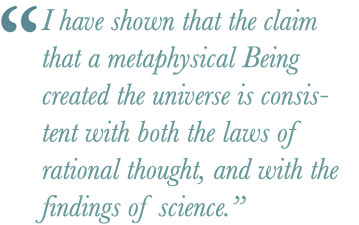 When restricted to a discussion of the origin of the universe, atheists typically cannot build a positive case for atheistic explanations. More often they are content to deconstruct and deride theistic positions, but have no real positions to counter. But, a theist should have every right to expect a rational explanation for a belief in atheism, just as a theist attempts to rationally explain his/her own belief in theism.
When restricted to a discussion of the origin of the universe, atheists typically cannot build a positive case for atheistic explanations. More often they are content to deconstruct and deride theistic positions, but have no real positions to counter. But, a theist should have every right to expect a rational explanation for a belief in atheism, just as a theist attempts to rationally explain his/her own belief in theism.
Restricting the discussion to the origin of the universe presses both the theist and non-theist to come to terms with the underlying presuppositions of their own worldviews and exposes the coherence and rationality (or lack thereof) of said views. In response to these assertions, atheists who are concerned with the rationality of their own position should attempt to make a positive argument for the cause of the universe. What do they think caused the universe, if not a metaphysical being? And, if atheists can’t think of a proper argument, they should at very least state what evidence they will allow to count in favor of the existence of a metaphysical being. Or, stated negatively, what evidence would count against an atheistic position?
While materialism, as I have described it in this essay,11 cannot rationally explain the origin of the universe, there are cogent reasons to believe that a metaphysical being who is transcendent, personal, and infinite has designed and created the physical universe. A being with these attributes is the only source with sufficient power and wisdom to create (i.e., encode with information) and sustain (i.e., through the laws of nature) the physical world (matter, fields and forces), and enable rational, free minds. A being who is without qualitative limitations (i.e., infinite) and exists apart from (i.e., transcendent) the created universe is the only sufficient source for the existence of the cosmos, as we know it. This claim is consistent with the ordered physical universe, with universal laws of cause and effect, with the existence of metaphysical ideals, with the existence of personal beings, with free will, and with the distinction and yet synthesis between mind and matter. Therefore the proposition that a metaphysical being created the universe serves as a rational and intellectually satisfying explanation of the origin of our universe.
References Cited
Dienes, K. R. (2017, June 12). Rethinking the Rules of Reality. Address presented at University of Arizona Lecture Series 2017: Rethinking Reality.
Dyson, F. (1988). Infinite in all directions. New York, NY Harper & Row.
Fahlberg, L.L., & Fahlberg, L.A. (1991). Exploring spirituality and consciousness with an expanded science: Beyond the ego with empiricism, phenomenology, and contemplation. American Journal of Health Promotion, 5(4), 273-281.
Hanna, Mark M. (2011). Biblical Christianity: Truth or Delusion? (Kindle Location 277). Xulon Press. Kindle Edition.
Spitzer, R. J. (2010). New Proofs for the Existence of God: Contributions of Contemporary Physics and Philosophy (p. 18). Eerdmans Publishing Co – A. Kindle Edition.
About the Author
David P. Diaz, Ed.D. is the publisher and owner of Things I Believe Project. An educator and author, Dr. Diaz has a lifelong love of learning. His pen name (aka “Don Quixote”) comes from his love of chasing windmills (i.e., truth and other ideals) and his penchant for tongue-in-cheek humor: “Don Quixote was developing his arguments in such an orderly and lucid way that for the time being none of those listening could believe he was a madman.”
Footnotes
- Materialism is a philosophical theory that claims that all reality consists of one kind of thing and that all distinctions in the world are nothing more than various alterations of the basic physical substrate. Many philosophers prefer to call the view “physicalism” because this term is more inclusive, encompassing not only material entities that are spatially extended but also fields and forces.
- Metaphysical being. In most cases within this essay, I am substituting this term in place of ‘God.’ God is the name we have used (in English language) throughout history to speak about an entity that is incapable of being completely described or defined by finite man. And yet, theists and non-theists alike have attributed numerous characteristics to their version of ‘god,’ thereby making the term meaningless.
In this essay, I am speaking of only those characteristics and attributes of such an entity that seem self-evident upon observation of the universe and an examination of its potential cause. I am not referring to the “God” of any particular religion.
- Methodological naturalism is a strategy for studying the world, by which adherents assume that the universe is a result of natural laws and is circumscribed by naturalistic theories. For purely methodological purposes, scientists choose not to look for nor consider supernatural causes during the process of conducting experimental or other types of research.
- Epistemology is a branch of philosophy that investigates the origin, nature, methods, and limits of human knowledge.
- Rational Norms. Rationality norms include basic principles across many disciplines that help us to make sense of our world. These norms include basic principles of logic (e.g., law of excluded middle), arithmetic (e.g., properties of equality), history (i.e., historical method), science (e.g., creating and testing hypotheses, seeking to be objective, etc.), ethics (e.g., honesty, respect for persons), and many others.
Though some of these “norms” are controversial, many remain uncontroversial because they are fundamentally indubitable and are considered “givens” (e.g., the principle of noncontradiction). Others are axioms considered universal and self-evident, which have achieved consensus within and across disciplines for best practices and proper methodologies to ascertain truth. Without a general acknowledgment of rational norms we couldn’t claim to know or explain anything. In other words, unless some norms or givens exist, we have no basis for any authentic claims about truth or reality.
- Physicality is a term that refers to the physical universe that encompasses not only material entities that are spatially extended but also fields and forces.
- Meta-science methods. Dyson did not provide details of how meta-science should be conducted (though he did give one example of meta-scientific explanation when he referred to the so-called Anthropic Principle). I liked Dyson’s separation, in principle, between meta-science and science because the very name reinforces the rigorous nature that should be characteristic of almost all modern academic disciplines.
Though delineating the methodologies for meta-science is outside the scope of this essay, the methods would primarily appeal to all rational norms that fall outside of the strict confines of methodological naturalism. Obviously, one would also utilize all forms of scientific evidence (when applicable) to compliment and enhance the knowledge of meta-science.
- Big Bang and related theories: Inflation theory, expansion theory, dark energy, dark matter (dark energy), and quantum effects are all now part of the standard model of cosmology (Spitzer, 2010).
- Transcendent, in theological discussions, usually refers to a being who is above, apart from, and beyond the created order.
- Information is the attribute inherent in sequences or arrangements of something such as the “structure” of DNA and atomic particles, or the “framework” of ideals (i.e., thoughts, ideas, love, etc.). However, such structures or frameworks are not information per se. Information refers to that which encodes the structures of everything that exists in the universe. Hence, not all things that exist are composed of matter or are reducible to matter.
- “While materialism, as I have described it in this essay…” I think it is most likely that those who espouse atheistic viewpoints can trace their underlying presuppositions to materialism as I have described it, even if they are unaware.